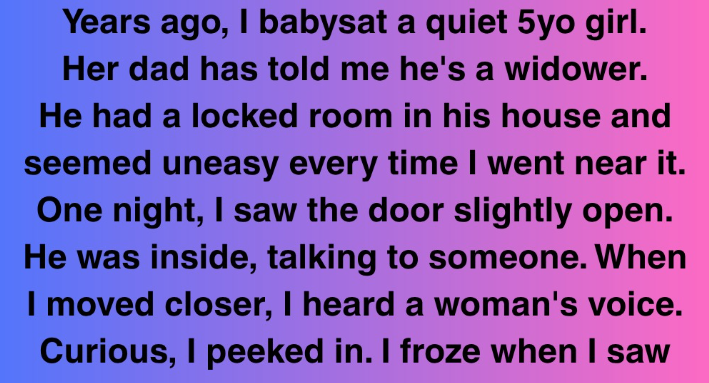Years back, I took on a babysitting gig for a reserved 5-year-old named Suri.
Her father, Kavian, mentioned he was a widower.
His home had a locked room, and he grew visibly tense whenever I lingered near it.
One evening, I noticed the door slightly ajar.
Inside, Kavian was speaking softly to someone. As I edged closer, a woman’s voice reached my ears.
Intrigued, I glanced inside. My breath caught when I saw—
—Kavian alone in the dim room, seated before a framed photograph on the wall.
The picture showed a striking woman with long dark hair and a gentle smile, cradling a newborn.
He sat cross-legged, murmuring quietly.
Yet I was certain I’d heard a voice—a real, living one, not a recording or his imagination. It came from that room.
I retreated, pulse racing, questioning if I’d misheard.
Could it have been a TV in another room? A video playing?
But when a floorboard creaked under my step, Kavian spun around, eyes wide, as if I’d stumbled upon a forbidden act.
He rose swiftly, closed the door, and said, “That room is private. Please respect my boundaries.”
I nodded, mumbled an apology, and returned downstairs to Suri, who was coloring contentedly, humming a tune, oblivious to the moment.
After that night, I steered clear of the door.
Yet an uneasy feeling lingered, hinting at something unspoken.
At 17, I was only babysitting to earn extra cash.
Kavian seemed like a good man—quiet, courteous, always paid promptly.
Perhaps overly formal, keeping a careful distance.
But small details began to nag at me.
Occasionally, I’d spot two mugs in the sink.
Or a woman’s scarf draped over a chair.
Once, while helping Suri search for her doll, I found a gold earring beneath the couch.
I asked Kavian about it.
He offered a strained smile and said, “My wife passed, but her belongings are still here.”
Fair enough, I thought.
But odd moments kept piling up.
One afternoon, Suri piped up, “Mommy says your hair is pretty.”
I paused, then gently said, “Sweetie, your mommy’s not here anymore, right?”
She looked puzzled, shrugged, and returned to her crayons.
Kids say odd things, I reassured myself.
But I began paying closer attention.
A few times, I thought I heard footsteps upstairs while alone with Suri.
Once, after stepping out of the bathroom, I found Suri in the hallway, staring at the locked door.
She said, “They’re arguing again.”
They.
That word sparked a deeper unease.
I started arriving early, hoping to glimpse the end of Kavian’s day before he left.
One time, as I entered through the front, I saw a woman slip out the back gate, hooded in a long coat.
I called out, but she hurried away without turning.
Inside, Kavian looked unsettled. He said he had to leave and rushed out.
I wanted to confront him—Who was she? Does someone else live here? Why does Suri talk about her mom as if she’s present?
But his expression stopped me. It wasn’t fear—it was closer to shame.
Curiosity gnawed at me.
Then I made a reckless choice.
One night, with Suri asleep early and Kavian not due back for an hour, I stood before the locked door.
I listened. Silence.
But the door wasn’t locked this time. It eased open with a touch.
Inside, the room felt frozen in time.
Photos lined the walls, clothes lay neatly folded in drawers, perfume bottles stood on a dresser, a pair of heels tucked beneath.
The woman’s presence filled the space.
I stepped inside, heart pounding, and then I saw it—a phone on the nightstand, screen glowing, warm to the touch, recently used.
I backed out quickly, said nothing when Kavian returned.
That night, I couldn’t sleep.
I didn’t return the next week, citing exam stress as an excuse.
But guilt over leaving Suri tugged at me.
Two weeks later, I called Kavian to check in.
He sounded surprised but grateful.
He asked if I could babysit again, just for one night, due to an urgent work meeting.
I agreed.
That evening changed everything.
When I arrived, Suri sat on the porch, barefoot, alone.
Kavian wasn’t home yet.
I asked who let her outside.
She pointed to the door and said, “Mommy said we could wait for you.”
A chill ran through me.
We went inside. I locked the door.
I tried to stay calm—maybe she was imagining things, or Kavian had let grief spiral into something unhealthy.
Then I noticed the upstairs hallway light glowing.
Soft music drifted down—a lullaby.
With Suri in my arms, I climbed the stairs slowly.
The music came from that room.
I stepped inside. Empty.
But on the mirror, in fogged breath, were the words: “She needs stability. Leave her alone.”
I backed out, trembling, and called Kavian, my voice unsteady.
He was home in ten minutes.
For the first time, he looked truly shaken.
He sat me down and said something unforgettable.
“You’re right. My wife isn’t dead. But she’s not fully here, either.”
He explained: when Suri was a toddler, his wife, Taraneh, suffered a psychotic break.
One morning, he found her in that room, rocking, insisting their baby was gone—while Suri slept safely in her crib.
She was diagnosed with schizophrenia.
Treatment helped briefly, but she rejected medication, convinced everyone was deceiving her.
Kavian couldn’t bear to institutionalize her.
So he kept her in that room, with locks inside and out, for her safety and Suri’s.
He told Suri her mother had passed to shield her from fear.
But Taraneh wouldn’t stay hidden. She emerged when he was away.
The scarf, the earring, the footsteps—it was her, living in a reality her mind had woven.
I was stunned, torn between shock and sorrow.
Suri sat nearby, humming, unaware.
I asked why he didn’t seek help.
He looked away and said, “Because I love her. And I know if I let her go, they’ll medicate her until she’s no longer the woman I married.”
I didn’t agree. I still don’t.
But I understood his heart.
That night, I stayed with Suri while Kavian spoke to Taraneh.
He told her things had to change, that this couldn’t continue.
I don’t know what unfolded in that room, but I heard soft weeping through the wall.
The next morning, I returned.
For the first time, I met Taraneh.
She was frail but alert, her eyes piercing.
She offered me tea and apologized for frightening me.
“I wanted to protect Suri,” she said. “I didn’t know how to be her mother anymore.”
Kavian arranged treatment for her.
It was a long road—months of relapses, tears, and supervised visits.
But healing began.
Suri learned the truth in small, gentle steps.
She didn’t resent them. She was confused but forgiving, as children often are.
Five years later, they live in a new home—smaller, calmer.
Taraneh takes medication and is stable.
Kavian remains her steadfast partner.
Suri, now in middle school, dreams of becoming a writer.
And me? I still babysit occasionally, but mostly I visit as a friend.
Sometimes we sit on their porch, and I reflect on how close I came to walking away for good.
It would’ve been simpler.
But the harder path often leads to the greatest change.
If there’s one lesson I carry, it’s this: silence solves nothing. Speak up, ask questions, stay curious, but always with kindness.
You never know whose life you might touch.
If this story resonated with you, please share it. Someone out there might need to hear it today.




